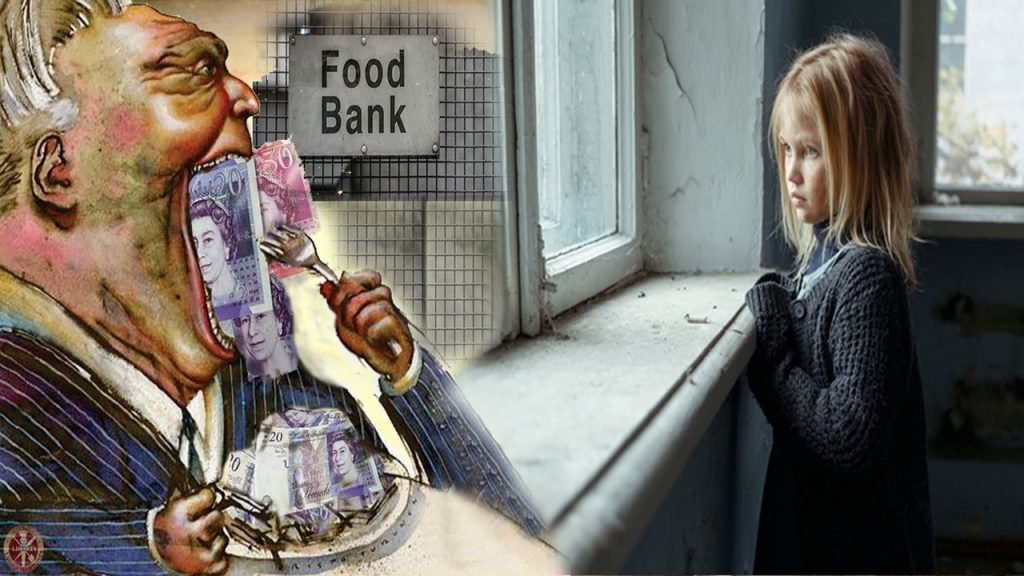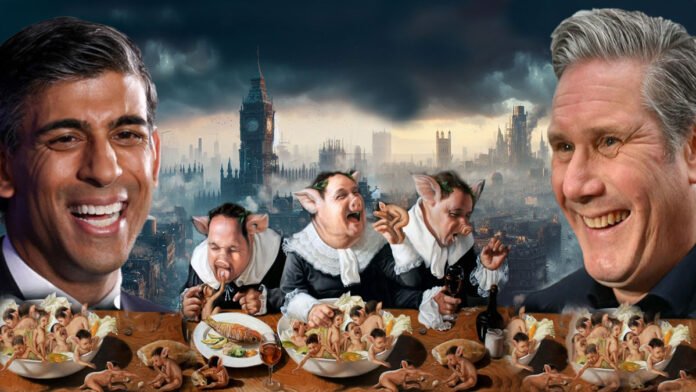UK’s Oligarch Rule: Propping Up Inequality, Abandoning The People
As the baton readies itself to be passed to the left wing of the Uniparty, the masses feel a consistent downward shove. Behind Westminster’s rotating doors, backroom deals and cronyism reveal an unsettling reality – both Tories and Labour govern for oligarchs, not citizens.
It shows in black and white a digital record of this dystopian Britain in the making. The UK spends more than anywhere else in Europe subsidising the cost of structural inequality in favour of the rich, according to an analysis of 23 OECD countries.
Leaders like Sunak and Starmer now enjoy power’s spoils. But their privilege blinds them to ordinary struggles. A damning report confirms paltry working class representation: just 1% of 350 Tory MPs, and only 13% of Labour’s 198 parliamentarians.
This begs the question – How can parties with so few working class voices led by oligarchs or their creatures claim to champion the majority’s cause? The disconnect signals a crisis of legitimacy amid widening inequality. It necessitates reevaluating a political ecosystem seemingly rigged against ordinary citizens from the outset by systemic biases.
While “levelling up” gets abandoned like other hollow slogans before it, the inequality burden weighs heavy. Recent research reveals the UK outspends all Europe bankrolling rich tax breaks and corporate giveaways. Consequences manifest in crippled communities and over 93,000 preventable deaths per year.
Yet Sunak still spouts fiscal prudence while eyeing tax gifts for his wealthy peers. And Starmer sticks stubbornly to austerity era playbooks that bled the North dry. Neither comprehends deprivation beyond spreadsheet sums.
To them, rising hunger, frozen families and unpayable bills are just inconvenient PR headaches, not urgent crises. Their insularity ubuntu mirrors a detached political culture funnelling wealth upwards, willfully neglecting public welfare.
This is oligarchy, not democracy – governance of the opportunistic by the opulent, for the opulent. A parliament led by multi-millionaires and a country of destitute. The struggling majority find their tentative grip slipping, betrayed by leaders turned loyal stewards for the rich we are left with an ever-widening gap of inequality…

No one is shocked when we learn the UK spends more financing inequality in favour of the rich than the rest of Europe, a report finds.
The UK spends more than anywhere else in Europe subsidising the cost of structural inequality in favour of the rich, according to an analysis of 23 OECD countries.
Inequalities of income, wealth and power cost the UK £106.2bn a year compared with the average developed country in the Organisation for Economic Co-operation and Development (OECD), according to the Equality Trust’s cost of inequality report.
When compared with the top five most equal countries, however, inequality costs the UK £128.4bn a year in damage to the economy, communities and individuals.
Fixing the NHS crisis, including funding the maintenance backlog, hiring more staff and increasing wages, would cost about £66.7bn over 15 years.
“Inequality has made the UK more unhealthy, unhappy and unsafe than our more equal peers,” said Priya Sahni-Nicholas, the co-executive director of the trust. “It is also causing huge damage to our economy: we have shorter healthy working lives, poorer education systems, more crime and less happy societies.”
Britain in the 1970s was one of the most equal of rich countries. Today, it is the second most unequal, after the US.
Sahni-Nicholas said: “There is a direct financial cost to inequality: the consequences of structuring society to allow for massive profiteering for the richest at the expense of the rest of us have been enormous.”
Overreliance on financial systems that allow for massive profits and wealth-hoarding has hollowed out our infrastructure, she added, encouraging massive regional disparities and leaving the UK vulnerable to shocks and recessions.

According to the report, the richest 1% in the UK represents the most costly top 1% group in Europe, paying the lowest taxes compared to similar groups in other large European countries. Danny Dorling, the author of “Inequality and the 1%,” argues that the benefits of allowing this disparity to persist are “almost impossible to defend.”
Dorling emphasises that inequality extends beyond economic implications, permeating into the cultural fabric and rendering social mobility unattainable. Merely being born outside the privileged 1% has far-reaching consequences, including reduced life expectancy, limited educational and employment prospects, and detrimental effects on mental health. He asserts that the cost of indulging the super-rich is simply too high for the rest of society to bear, necessitating urgent redress.
Stewart Lansley, author of “The Richer, the Poorer” and “The Cost of Inequality,” highlights the acute paradox of contemporary capitalism. As societies become more prosperous, an increasing number of individuals are unable to afford basic material and social needs. Lansley points out that child poverty in Britain has doubled in the past 40 years, while modern tycoons revel in luxury, from private jets to private islands.
Lansley attributes this skewed distribution of wealth to the systematic appropriation of growth gains by a small group of financial and business magnates, facilitated by state policies. This process has led to a broken economy, diminished public services, stagnant or declining living standards, a significant rise in child poverty since the late 1970s, and a decline in social resilience.
He argues that a significant portion of today’s economy revolves around unproductive activities driven by personal rewards, a far cry from the entrepreneurial culture once promised by Margaret Thatcher and Tony Blair. Lansley highlights that several factors contribute to the further enrichment of the already wealthy, none of which serve a significant social purpose. Furthermore, the privatisation of national assets and infrastructure, with nearly nine-tenths now privately owned, has made Britain one of the most heavily privately and narrowly owned economies among wealthy nations.

The Cost of Inequality
According to the Equality Trust’s comprehensive analysis, inequalities in income, wealth, and power exact a staggering toll of £106.2 billion annually on the UK economy. When compared to the average developed country in the OECD, the UK spends more on subsidising structural inequality. In fact, the cost of inequality in the UK is £128.4 billion higher than that of the top five most equal countries. These stark figures underscore the urgent need for addressing the deep-rooted disparities plaguing the nation.
Implications for Society:
The repercussions of inequality extend far beyond economic consequences. Priya Sahni-Nicholas, the co-executive director of the Equality Trust, highlights the detrimental impact on various aspects of society. From shorter healthy working lives to poorer education systems, increased crime rates, and less happy societies, inequality has left the UK lagging behind its more equal peers. In a remarkable shift, Britain, which was once one of the most equal rich countries in the 1970s, now holds the unenviable position of being the second most unequal, trailing only the United States.
The Financial Cost of Inequality:
The report further exposes the direct financial cost of inequality in the UK. The richest 1% in the country enjoy the status of Europe’s most expensive top 1% group, yet they pay the lowest taxes compared to similar groups in other large European countries. Danny Dorling, author of “Inequality and the 1%,” rightly questions the sustainability of such a system, stating that the benefits derived from allowing this disparity to persist are indefensible. The consequences of inequality permeate society beyond mere economics and contribute to a culture that divides, making social mobility an elusive dream. Urgent action is needed to restore a fair balance.
The Hollowing Out of Infrastructure:
The report highlights the repercussions of an overreliance on financial systems that prioritize massive profits and wealth accumulation. This approach has led to the erosion of the UK’s infrastructure, exacerbated regional disparities, and left the nation vulnerable to economic shocks and recessions. Stewart Lansley, author of “The Richer, the Poorer” and “The Cost of Inequality,” identifies a paradox in contemporary capitalism, where rising prosperity coexists with a growing inability for many to afford basic material and social needs. Lansley attributes this phenomenon to a small group of financial and business magnates who have disproportionately benefited from economic growth, aided by state policies.
A Call for Redress:
Lansley emphasises that Britain’s deep-rooted problems, such as a broken economy, deteriorating public services, declining living standards, and the doubling of child poverty, can be traced back to the prioritization of enriching the already wealthy. He argues that too much of the current economic activity revolves around unproductive endeavours that primarily serve personal gain, deviating from the entrepreneurial culture once promised by figures like Margaret Thatcher and Tony Blair. The story told of a trickle-down system where all ships would rise translated to the plunder of our common ownership and the theft of public resources from energy to mail, rail and water. With the majority of national assets and infrastructure privately owned, the UK has become one of the most heavily privately and narrowly owned economies among wealthy nations.
Conclusion:
The report reveals inequality’s stark impacts – lower healthy life expectancy, increased mental illness, high incarceration rates and more homicide. The UK lags behind peers in all these metrics. For deprived regions betrayed by Westminster, the damage is visceral.
But party leaders Rishi Sunak and Keir Starmer inhabit worlds apart, cosseted by elite privilege. Their cabals feature bankers, not workers, donors over citizens. An out of touch political class rubs shoulders at Davos while lecturing hard-pressed families on belt tightening.
These leaders parachuted in to represent “ordinary people” are anything but. Their vague platitudes mask indifference towards everyday indignities and worries. Yet they eagerly assist the richest, slashing taxes on swollen fortunes. Society restructured so a parasitical elite can extract windfall profits, while public services face willful neglect.
Without systemic reform, this corrupt status quo Persists, concentrating power and wealth in fewer hands. The alarming reality of oligarch rule within the UK’s major political parties and the substantial burden of inequality on society cannot be ignored. Labour under Starmer offers no meaningful alternative, content on winning power not fixing deep rooted problems. But public patience wears thin for an economy that only works for the few. The astronomical price of inequality can no longer be ignored or excused.
It is time to demand politicians grounded in the real world, not bubble-wrapped by aristocratic grandeur. Solutions start by ceding power to communities long denied influence over their fates and embracing economic reality beyond South Kensington townhouses. Until leaders emerge from the ranks of those truly battling this brutal status quo, Britain’s yawning divides will persist. The people yearn to shape their own destinies, not watch passively while detached elites drive society over the inequality cliff, into the abyss below.
Accountability is coming…
Support Independent Journalism Today
Our unwavering dedication is to provide you with unbiased news, diverse perspectives, and insightful opinions. We're on a mission to ensure that those in positions of power are held accountable for their actions, but we can't do it alone. Labour Heartlands is primarily funded by me, Paul Knaggs, and by the generous contributions of readers like you. Your donations keep us going and help us uphold the principles of independent journalism. Join us in our quest for truth, transparency, and accountability – donate today and be a part of our mission!
Like everyone else, we're facing challenges, and we need your help to stay online and continue providing crucial journalism. Every contribution, no matter how small, goes a long way in helping us thrive. By becoming one of our donors, you become a vital part of our mission to uncover the truth and uphold the values of democracy.
While we maintain our independence from political affiliations, we stand united against corruption, injustice, and the erosion of free speech, truth, and democracy. We believe in the power of accurate information in a democracy, and we consider facts non-negotiable.
Your support, no matter the amount, can make a significant impact. Together, we can make a difference and continue our journey toward a more informed and just society.
Thank you for supporting Labour Heartlands












